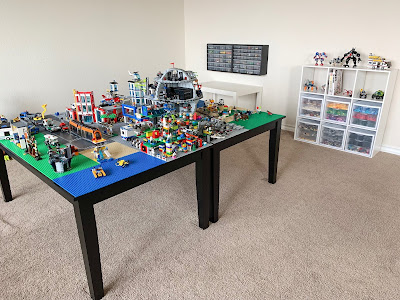There are several approaches to paying your child an allowance. Parents also take into consideration what age to start and how much to give. Some approaches are:
* Chores for money - completing chores in exchange for money or a list of chores with a set price per chore.
* Give a regular amount of money weekly, bi-weekly or monthly without requiring the child to earn the money.
* Contribute to the family by doing certain chores around the house for free and get paid for larger chores or tasks.
All approaches have their pros and cons. It's whatever works best for your family.
When my son was 3, we encouraged taking gift money he received to the bank. He walked in, handed his money to the teller and got a lolliop. We explained what money in the bank/his savings account meant as best we could. When he was 4, I started going to the drive thru ATM for deposits. After making the ATM selection, I would pull up a little so he could deposit his money in the ATM. He understood the meaning of money well enough and knew he could buy things when he was given money. We explained saving money sometimes, and why, and spending it sometimes. He grasped the concept well enough.
He was given money at Christmas when he was 4 1/2, and he was quick to say he was buying a Lego with it. Since money came from 2 people, we encouraged taking some to the bank for his savings account and keeping some for whatever he wants to buy. He agreed and decided he wanted to save his spending money to buy the $500 Lego Death Star. Ummm. OK. I guess we all need goals.
Since he has a good understanding of money, and willfully makes deposits to his savings account, we decided to implement an allowance. Scott and I gave it a lot of thought. Our son was putting away his clean laundry, on his own, when he was 3. He sets the table, folds towels, helps put away mine and Scott's laundry, etc. Scott and I feel like these things are part of contributing to the family. We wanted to come up with harder tasks for our 4 year old son to earn his money. After much consideration, we decided to pay him $4/week to sort all the dirty laundry on Monday (with my guidance) and to clean the gameroom on Friday. Neither of these tasks are easy or quick. I agree that these are things we do to contribute to the family, but we had to start somewhere. We'll re-evaluate the system as needed.
We told him the concept of an allowance for several days leading up to the big day. It was Monday, and he knew we were going to discuss it, as a family, at dinner. We took one bite of food, and he, very excitedly, asked, "So are you ready to talk about money, guys?!" We explained our expectations of contributing to the family like he already does, what chores he could do every week to earn his $4, and how a portion of it would go to savings and his own spending money. He was excited. We all agreed how much he would designate to savings and spending. If he doesn't do his 2 chores, he doesn't receive the money. Scott and I discussed with each other how his earned money should not be taken from him, or used as a threat, for bad behavior.
I made 2 mason jars for him to put his money in. We'll create a charity jar some day. Since the words savings and spending look similar, I chose to use the word bank. When the bank jar gets full, we'll make a bank deposit run. When I give him some of my coins, he will run to put some in the bank jar and some in the spending jar. I love that it's already a habit, at 4 years old, for him to put money in savings.
Our son knows his numbers and the concept of greater than and less than. He doesn't know the value of coins, so this is a great opportunity for us to start teaching him. Some people feel that a child should be given an allowance when they can count money and not sooner than that. That wasn't the case for our family. Our son has a lot of grandparents and loved ones, and he is constantly receiving. I never anticipated giving an allowance to a 4 year old. It just seemed like a good way and a good time, for our family, to start teaching money management. We want our son to stay humble, and we want him to know it's a privilege to be given money, clothes or toys. We want him to understand money isn't free, to be able to make the decision to buy something with his hard earned money, and to get used to saving a portion of every thing he earns. I think the shock of taxes can come later.








































